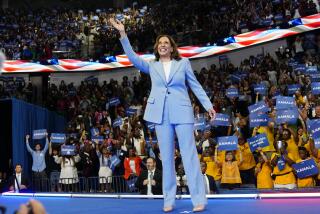Wofford Victory Would Give Democrats New Life : Politics: His strategy in Senate race with Thornburgh in Pennsylvania is seen as what party must do in 1992.
- Share via
PHILADELPHIA — By appealing to resentment of Washington and anxiety about the recession, recently appointed Democratic Sen. Harris Wofford is threatening a stunning upset of Republican challenger Dick Thornburgh in next Tuesday’s U.S. Senate special election.
Perhaps even more significant, the erstwhile 1960s liberal is blazing an ideological trail that many believe the Democratic Party needs to follow across a discontented nation next year in its pursuit of the presidency.
“I’m a different kind of fish, who has not been an ordinary politician,” Wofford, who has never run for office before, said at a breakfast appearance here last week. “But let me tell you, this is the moment when people around this state don’t want an ordinary politician.”
Wofford, 65, has got that right, judging by his apparent success so far against former U.S. Atty. Gen. Thornburgh, a former two-time governor of Pennsylvania and an ally of President Bush. The two men are running for the Senate seat previously held by the late John Heinz, a Republican who was killed in a plane crash in April.
According to a poll released Tuesday by the Pittsburgh Post-Gazette and WTAE-TV in Pittsburgh, Wofford, who once trailed the 59-year-old Thornburgh by nearly 45 percentage points, now leads him by 4 points among likely voters.
Two broad themes underlie Wofford’s message. The first is a promise to “shake Washington up from top to bottom.” The second is a pledge to shake the Democratic Party free from its preoccupation with programs targeted at the poorest citizens and to turn its attention back to the middle class, which in the party’s presidential heyday provided the votes that carried it to victory.
“If Wofford wins or comes close, this is going to breathe new life into the Democrats nationally and stand national politics on its head,” predicts Terry Madonna, director of the Center for Politics and Public Affairs at Millersville University in Lancaster, Pa.
“Wofford is calling for a fundamental change in the way we do business,” says Al From, head of the centrist Democratic Leadership Conference. “And this is what Democrats need to do to win in 1992.”
The notion of change seems to have been easily absorbed by Wofford. The Democratic candidate, who Thornburgh campaign manager Michele Davis says was initially regarded as “a well-meaning, behind-the-times college professor,” Wofford has transformed himself into a veritable populist firebrand.
In July, two months after Democratic Gov. Robert P. Casey appointed him to fill the seat left vacant by Heinz’s death, Wofford renounced the $23,200 pay raise the Senate had voted itself and said that he would give the extra money to a charity for survivors of Persian Gulf War casualties.
“There’s a national recession out there,” he declared. “Now is no time for us to be paying ourselves more of our taxpayers’ hard-earned dollars.”
At the same time, in keeping with a promise he had made when he was appointed, Wofford rejected the $150,000 he was supposed to receive, along with other senators, to pay for mass mailing expenses.
Then, to dramatize the health insurance proposal that is the centerpiece of his campaign agenda, Wofford two weeks ago introduced a bill that would deny himself and his fellow lawmakers the free medical care that they now receive from the government until they enact some form of national health insurance.
“The Constitution says that if you are charged with a crime, you have a right to a lawyer,” Wofford tells voters. “But it’s even more fundamental that if you’re sick, you should have the right to a doctor.”
Meanwhile, Wofford’s TV commercials accuse Thornburgh of “helping to create the mess in Washington” as attorney general by not vigorously pursuing the “S&L; crooks” and by allowing the Justice Department to impede the investigation of the scandal at the Bank of Credit & Commerce International. Thornburgh responded with a commercial claiming that Justice “is the only agency in the world to successfully prosecute BCCI.”
Wofford also contrasts his backing for a middle-class tax cut with Thornburgh’s support for “a capital gains tax break for the wealthy,” a proposal favored by the President. And he attacks the endorsement of the proposed free-trade agreement with Mexico, which Wofford charges will put “American jobs on a fast track to Mexico.”
With these and similar tactics, Wofford is striving to tap the same vein of citizen indignation that Bush sought to exploit last week when he denounced Senate and House members “as a privileged class of rulers.”
This pervasive sense of frustration and resentment is widely believed to have helped ex-Ku Klux Klan leader David Duke finish off Louisiana’s Republican Gov. Buddy Roemer in an Oct. 20 primary and thrust himself into a runoff election next month for that state’s highest office.
It is not hard to find evidence of public alienation in Pennsylvania. Unemployment is running just under 7%. But, according to Madonna of Millersville University, this statistic does not reveal the full story of the downturn’s economic and political impact.
“This recession has really hit real estate prices and the financial community” as well as the state’s industrial base, Madonna says. “You have a lot of people afraid to spend money and worried about paying big tuition bills for college. And all this comes when people are reading about congressmen kiting checks and not paying restaurant bills.”
The economic squeeze is widely felt here in the state’s largest city, where last week, at the 30th Street rail depot, James Hurtt, an Amtrak car inspector, looked on as the president of the Transportation Workers Union local endorsed Thornburgh for the Senate.
“I don’t know who I’m voting for,” said Hurtt, noting that his hourly wages have risen only from $12.02 to $12.81 since 1982. “I’m tired of hearing the same old line from politicians. We want somebody who will look out for the common folk instead of setting them against each other.”
What distinguishes Wofford’s response to such disgruntlement is that it is based on the fundamental Democratic conviction that government can be made to work to meet middle-class needs. “Government goes wrong when it doesn’t do what it needs to do, what it ought to do,” said Wofford, who first entered government to help launch President John F. Kennedy’s Peace Corps.
Wofford is quick to emphasize, though, that Democrats should think of government as a means to an end, not an end in itself.
He cites health care as a case in point. “If the Democrats take action for national health insurance, not to have a government-run health program but instead to take action that people want, that’s part of the answer” to voter cynicism, he said.
Wofford has proposed a set of guidelines for a national health insurance program that would provide universal coverage and be administered by a nonprofit corporation that would deal with a variety of private insurance companies that would guarantee full coverage at minimal costs.
He estimates that such a framework could save $50 billion over the current $650 billion annual total of public and private expenditures for health care.
But Wofford emphasizes that he is not locked into any single blueprint. “What I most want out of the election is not to go down to Washington and say, ‘the people of Pennsylvania support my plan,’ ” he said last week. “I want to be able to go down and say they want action on national health insurance. The call from the election will not necessarily be a call for any one plan--it will be a call to get moving on this.”
As for Thornburgh, his initial emphasis on the experience he gained in Washington’s “corridors of power” during his three years as attorney general has fallen flat in this anti-Washington environment.
Nor did it help his cause when his campaign manager, Davis, facetiously told an Associated Press reporter of the campaign’s plans to depict Thornburgh as the “salvation” of “this sorry-assed state,” a comment that was widely reported.
In response to the hard economic times, Thornburgh has called for federal assistance in rehabilitating abandoned industrial sites, establishing tax-free enterprise zones and applying new technologies to help local firms compete in world markets.
For the most part, though, Thornburgh has been relying on a two-pronged strategy. He stresses his record in Harrisburg as governor--”I rebuilt the economy. . . . We had more people working than at any time in history,” he claims.
And he is striving to link his opponent to Gov. Casey, in whose Cabinet Wofford served as labor secretary, hoping that Casey’s current unpopularity for having pushed through a big tax increase will rub off on Wofford.
But even if the better-known Thornburgh manages to win by a narrow margin next week, Wofford’s candidacy will have demonstrated the power of voter discontent with Washington insiders. In some ways, it may be a tough lesson for Democrats, who have so long considered themselves the party of government.
“The best chance for beating the Republicans in 1992 is that, by and large, it’s hard for them to say that they are the party of change in Washington,” Wofford contends. “But that isn’t easy for Democrats either, because they have controlled the Congress.”
Profile: Harris Wofford
Born: April 9, 1926.
Hometown: New York City.
Education: Bachelor of arts, University of Chicago, 1948; LL.B., Yale University, 1954, and Howard University, 1954.
Career highlights: Special assistant to President John F. Kennedy, 1961; director, Ethiopian program, U.S. Peace Corps, 1962-64; associate director, Peace Corps, 1964-66; president, College at Old Westbury, State University of New York, 1966-70; president, Bryn Mawr College, 1970-78; chairman, Pennsylvania Democratic Party, 1986; Pennsylvania secretary of labor, 1987-1991, appointed U.S. senator, 1991.
Personal: Married to Emmy Lou Clare Lindgren, 1948; three children, Susanne, Daniel and David.
Profile: Dick Thornburgh
Born: July 16, 1932.
Hometown: Pittsburgh, Pa.
Education: Bachelor of engineering, Yale, 1954; LL.B., University of Pittsburgh, 1957.
Career highlights: Assistant attorney general, criminal division, U.S. Justice Department, 1975-77; governor of Pennsylvania, 1978-86; director, Institute of Politics, John F. Kennedy School of Government, Harvard University, 1986-87, U.S. attorney general, 1988-91.
Personal: Married to Virginia Walton Judson, 1963; four children, John, David, Peter and William.
More to Read
Get the L.A. Times Politics newsletter
Deeply reported insights into legislation, politics and policy from Sacramento, Washington and beyond. In your inbox twice per week.
You may occasionally receive promotional content from the Los Angeles Times.










